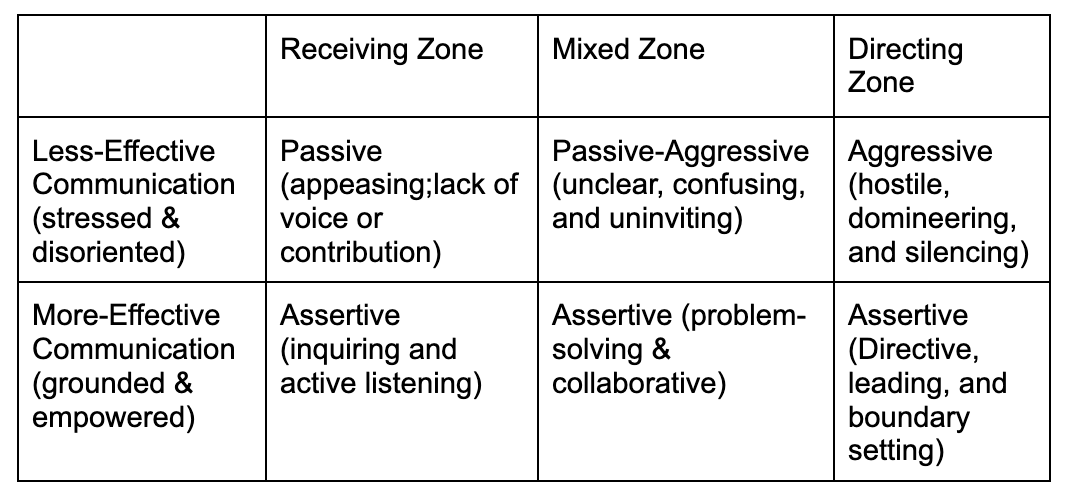What’s YOUR Communication Style? Better Relationships for women in Charleston, SC
What is your communication style?
Are you passive, passive-aggressive, aggressive—or something else entirely? Communication is more than just talking or listening—it’s knowing when to do which. The goal is to move smoothly between listening and expressing yourself, depending on the moment. Developing your communication skills can be incredibly useful for strengthening your work success and social life. Intentional communication can also deepen the quality of your relationships. Harnessing your communication skills for your intimate relationships improves the connection, cohesiveness, and the ability to work through the inevitable conflicts.
Communication Zones
There are different “communication zones”, each with a purpose. Sometimes, we need to lead or be direct. Other times, we need to listen and support. A lot of times we are living somewhere in between. By understanding and harnessing skills from each zone, you can seamlessly navigate your personal and professional relationships with more awareness.The three zones of communication include the receiving zone, the directing zone, and the “mixed” zone. Each zone describes the quantity of contribution to the conversation, but all are equal in importance and quality of communication. Effective communication is assertive communication. One can be assertive in all three zones.
The receiving zone includes more listening then talking. This zone is incredibly effective for communicating by letting others feel seen and heard and by understanding a different or new experience. When disengaged, stressed, disoriented, or scared, this zone looks a lot like passive communication which is ineffective due to the lack of connection and authenticity. It’s hard for meaningful change to happen when one party is being passive.
The directing zone includes more talking and leading in conversations. The directing zone is crucial for expressing visions, needs, and boundaries. This zone is important for self-protection, self-expression, and leading. This zone can be very ineffective if someone is so stressed and disoriented that they are coming across as aggressive. Aggressive communication feels hostile and discouraging of other voices.
The mixed zone is in the middle of the receiving and directing zone and uses both listening and contributing to communicate with others. This zone is collaborative and often focused on problem solving and connection building. If someone is unskilled or uncomfortable with directive communication, they are more likely to lean into this zone with “passive-aggressive” tendencies. This means when they try to express a need, vision, or boundary they may do so in a way that is unclear, confusing, or uninviting.
Reflection questions:
Communication styles exist across a spectrum and you may have different styles in different areas in your life. You may naturally fall more often in to one zone, and that’s okay! Consider your area of strength and the others as your areas of growth! Use these reflection questions to explore where you may fall on the spectrum in different areas of your life.
Are you more of a listener or a talker? Think deeper: do you work things out by talking it out or being quiet with your thoughts? Do you love expressing yourself or do you love hearing more about other people?
When are you more likely to be a good listener? When are you more likely to say something you don’t mean?
Is it easy or hard for you to express your thoughts, needs, or boundaries? When you speak? What do you share?
Are you more reserved with private details or do you lean towards dumping it all out?
Do you avoid or embrace conflict? Are you a people-pleaser, or do you like shaking things up?
In what areas in my life (ex: work, friends, family, etc.) do I feel most comfortable expressing myself? Which areas do I feel least comfortable? Why?
What makes you feel grounded? What actions or activities make you feel calm, clear, and secure?
What makes you feel empowered? What actions or activities make you feel confident and expressive?
Before you speak, get grounded.
Feeling overwhelmed or reactive? Try this:
Pause and reflect- how stressed and regulated am I feeling right now?
Take some deep breaths or engage in one of your favorite calming activities- give yourself some time whether it’s a 60 seconds or 24 hours to make sure you are in a less reactive place of communication.
Remember your intention- Ask what you are trying to achieve out of your communication?
Speak Confidently, get empowered.
Feeling like the cat has your tongue? Try this.
Reach out to a friend for support- reach out to your favorite hype person or someone you know you can trust to practice or get some encouragement.
Try writing it out first- put the words to paper to give yourself some practice and clarity!
Exercise, sing, draw, or do whatever it is that makes you feel most strong and most like yourself.

